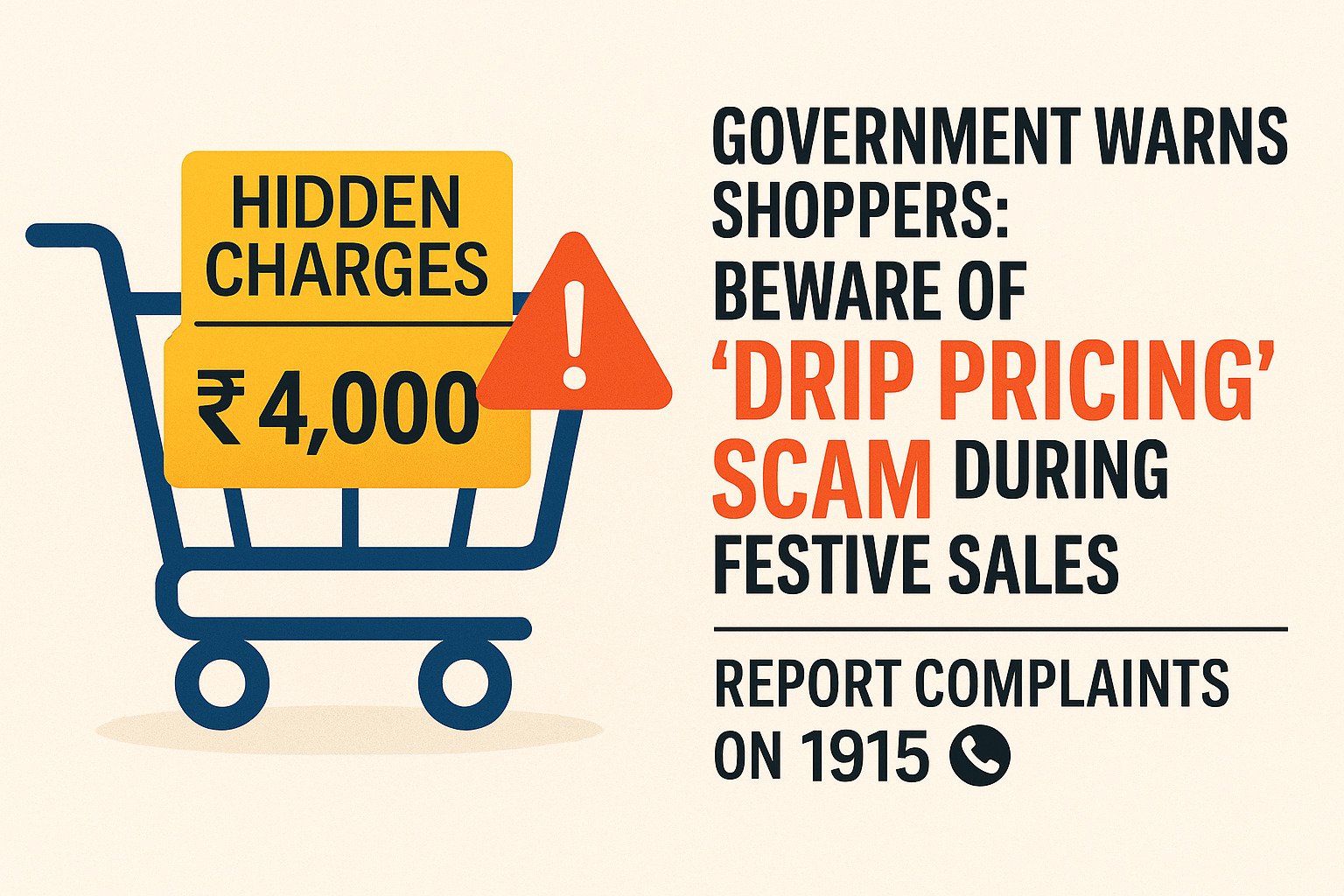Government Warns Shoppers: Beware of ‘Drip Pricing’ Scam During Festive Sales, Report Complaints on 1915As India’s festive shopping season reaches its peak, the government has issued a strong consumer advisory against a deceptive online pricing practice known as “Drip Pricing.” The Ministry of Consumer Affairs, in an official statement released on October 22, 2025, warned e-commerce platforms against misleading consumers with hidden charges that inflate prices during checkout.
Consumers have been urged to stay alert while shopping on major e-commerce websites like Amazon, Flipkart, and Meesho, and to report suspicious price discrepancies to the National Consumer Helpline at 1915 or via www.consumerhelpline.gov.in.
What Is “Drip Pricing”?
“Drip Pricing” is a marketing tactic where a product or service appears cheaper at first glance, but additional costs are gradually added as the customer moves through the purchase process — from the product page to the checkout.
For instance, a pair of shoes might be displayed for ₹4,000, but at the final payment stage, the total rises to ₹4,200 or more due to platform fees, packaging costs, handling charges, or other hidden surcharges.
Industry experts explain that this strategy plays on consumer psychology — once a buyer has mentally committed to a purchase, they are more likely to proceed even after seeing extra charges.
The First Firm to Assess Your DFIR Capability Maturity and Provide DFIR as a Service (DFIRaaS)
Government’s Cautionary Message
The Consumer Affairs Ministry, through its official post on X (formerly Twitter), highlighted the issue stating:
“It looks like a great deal at first, but the price goes up at checkout — that’s the ‘Drip Pricing Dark Pattern.’”
The ministry emphasized that this form of deceptive pricing misleads consumers and violates principles of price transparency under consumer protection laws.
Festive Season Risks
With festive sales and flash discounts flooding e-commerce platforms, consumer enthusiasm often overshadows caution. Experts warn that such high-volume sale periods become breeding grounds for manipulative pricing patterns.
“During festival campaigns, buyers tend to focus on deals rather than details. That’s when hidden charges slip through unnoticed,” said a senior market analyst tracking online consumer behavior.
Expert View: Prof. Triveni Singh
Noted cybercrime expert and former IPS officer Prof. Triveni Singh described drip pricing as “a modern form of digital deception” that erodes consumer trust in online markets.
“Drip pricing is not just an aggressive marketing tactic — it’s a deceptive practice that intentionally hides the true cost of a product. It violates transparency and consumer rights,” he said.
He also pointed out that many e-commerce platforms now use algorithmic pricing tools that modify prices dynamically based on consumer behavior and demand trends.
“Consumers must always check the final price breakdown before confirming a payment and avoid sharing sensitive information on unfamiliar websites,” Singh advised.
He further urged regulatory authorities to enforce stricter monitoring and impose penalties on companies engaging in such misleading practices.
How to File a Complaint
If consumers encounter drip pricing while shopping online, they can immediately file a complaint through the following channels:
1. Call: National Consumer Helpline – 1915
2. Online: www.consumerhelpline.gov.in
3. WhatsApp: Send details and screenshots to 8800001915
It is recommended to keep a screenshot of the product listing, payment receipt, and order details when filing complaints for faster resolution.
How to Stay Safe
- Shop only from reputed and verified e-commerce platforms.
- Always review the final price breakdown before making payment.
- Avoid deals that appear too good to be true.
- Never share personal or banking information on unverified links or third-party apps.
- Check app ratings and customer reviews before downloading or purchasing.
The Bottom Line
As India’s e-commerce ecosystem expands rapidly, deceptive practices like drip pricing threaten consumer confidence and fair market transparency. The festive season may promise irresistible deals, but vigilance remains the consumer’s best defense.
Prof. Triveni Singh summarized it aptly:
> “Digital markets are evolving faster than consumer protection mechanisms. Awareness is the strongest shield for buyers today.”
So, the next time you spot a deal that looks too cheap to be real, take a closer look — the hidden cost might be waiting at the checkout. If you suspect foul play, call 1915 and make your voice heard.


